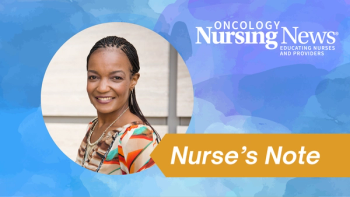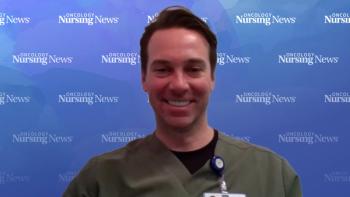
- September 2018
- Volume 12
- Issue 7
Pursuing a Calling: From Convent to Cancer Care
How Kathleen Shannon Dorcy, PhD, RN, FAAN, became a leading voice in oncology nursing.
Kathleen Shannon Dorcy, PhD, RN, FAAN (left)
working with a pediatric patient and his
nurse, Rose Nankinga, in Uganda in January 2018.
From her start washing laundry at a nursing home to her most recent work to improve nurse education in Uganda, Kathleen Shannon Dorcy, PhD, RN, FAAN, has felt she was called to make a difference in world health.
As director of clinical nursing research, education, and practice at the Seattle Cancer Care Alliance (SCCA), and a staff scientist at Fred Hutchinson Cancer Research Center, she mentors many nurses and expands nurse education around the world. She has been a part of moving research to bedside care and believes that nurses make important contributions to improving cancer care.
“The suffering caused by the burden of cancer cannot be underestimated,” she says. “The work we do in nursing, especially oncology, has to be a sense of envisioning better, working as a team to get there.”
This vision has driven Shannon Dorcy throughout her work in clinical care nursing, and she shares that vision with other nurses locally and globally.
HER PATH TO CANCER CARE
After high school, Shannon Dorcy briefly joined a Dominican convent. The Dominicans believe in working with people to search for their personal truths. “The Dominicans believe truth, ‘veritas,’ is always being revealed,” she says.
Within 2 years, Shannon Dorcy left the convent, feeling her search for truth and her calling were better found in education and nursing. As a licensed practical nurse, she worked in a nursing home where she always found a way to connect with the patients through something that was important to them. Soon she was back in school earning a bachelor’s degree in nursing. Afterward, she worked in orthopedics and pediatrics, then pursued her master’s degree in nursing at the University of Washington while working in a research position in pediatric oncology at Fred Hutchinson Cancer Center.
“I had not wanted to be in cancer care,” she says. “I thought it would be too sad.” But her experiences caring for people with cancer changed her mind. “I was captivated by families and children and the people I came in contact with,” she adds.
Shannon Dorcy cared for a 3-year-old girl named Kelly with severe graft-versus-host disease after a bone marrow transplant who had come to Seattle to receive an experi¬mental treatment. Kelly responded well to the treatment, and within a few months, her treatment was approved by the FDA. Kelly was able to go home to Michigan just in time for Christmas and continue to receive the new treatment. “I felt great joy at seeing clinical research move from concept to care and bring a good outcome to a child and her family,” Shannon Dorcy says.
She has continued working at Fred Hutchinson and the SCCA. She has enrolled patients in clinical trials, worked on exciting advances in cancer care, and continued learning. In 2015, she earned her doctorate studying hope and how it influences people to enroll in clinical trials. She has also worked on early research into immunotherapy, targeted therapies, and monoclonal antibodies.
BECOMING A MENTOR
Through decades of experience in clinical research and patient care, Shannon Dorcy has a lot to share with other nurses. She’s committed to improving the profession and supporting nurses in finding their own callings.
“As nurses, we can become weary because of so many pressures,” she says. “How to be a nurse, how to keep up with outstanding scientific development, how to handle the heartbreak as illness takes babies or parents or grandparents. We need to build a sense of connection for ourselves as nurses.”
At SCCA, Shannon Dorcy focuses on empowering nurses to think differently and work with each other as well as other layers of their organizations. She encour¬ages nurses to always ask questions and seek ways to do things better and finds it rewarding to watch the nurses in her organization take the lead. One example is when a protocol was developed to implement a scalp cooling program at SCCA; the nurses were instrumental in bringing that service to patients.
In addition to mentoring nurses, fellows, and students, Shannon Dorcy represents SCCA as part of a community effort called Career Work$ Medical, which prepares participants for careers in the healthcare industry. Seattle is notoriously expensive, and it can be difficult for young people to attend school or get entry-level jobs that will become careers.
“We try to reach young people who are disenfran¬chised and help them find employment across the region,” Shannon says.
Kathleen Shannon Dorcy, PhD, RN, FAAN, (top right corner) with Seattle Cancer Care Alliance colleague Arlyce Coumar, RN, OCN (bottom left), and students in the continuing education course they taught in Uganda.
SERVING INTERNATIONALLY
SCCA’s tagline is “better together,” which extends beyond Seattle to building up cancer care and the nursing field around the world. Shannon Dorcy has also spread her knowledge outside the United States, working with institutions at which SCCA has existing affiliate networks for physicians and researchers to develop stronger programs for nursing outreach. She has taught classes in Guam to help nurses gain oncology certification. Most recently, Shannon and others taught more than 100 nurses at the Uganda Cancer Institute; these nurses stay connected to SCCA and to each other with streaming courses.
“There’s a sense of greatness, not only in the individual, but also in community access,” Shannon says about her work. “The best care happens when everyone comes together.”
Last year, Shannon Dorcy’s lifetime of service to nursing was recognized when she was inducted as a fellow in the American Academy of Nursing. She is excited about the added level of exposure and influence that being a fellow allows her.
“It means I have the power to touch other people across the country, to bring in new ideas and continue scientific exploration,” she says. “I can be part of policy setting and advocate for equitable funding for underresourced areas nationally and globally.”
Articles in this issue
about 7 years ago
Prostate Cancer Screening Is Controversialover 7 years ago
Impact of Goals of Care on Resource Use at End of Lifeover 7 years ago
Novel RET Inhibitor Tested in Patients With NSCLC, MTCover 7 years ago
Celebrating Nurses All Year Longover 7 years ago
The Role of Volunteers in an Oncology Settingover 7 years ago
The New MM: Medical MarijuanaNewsletter
Knowledge is power. Don’t miss the most recent breakthroughs in cancer care.
















































































